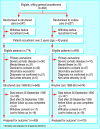Randomised controlled trial of structured personal care of type 2 diabetes mellitus
- PMID: 11679387
- PMCID: PMC59690
- DOI: 10.1136/bmj.323.7319.970
Randomised controlled trial of structured personal care of type 2 diabetes mellitus
Abstract
Objective: To assess the effect of a multifaceted intervention directed at general practitioners on six year mortality, morbidity, and risk factors of patients with newly diagnosed type 2 diabetes.
Design: Pragmatic, open, controlled trial with randomisation of practices to structured personal care or routine care; analysis after 6 years.
Setting: 311 Danish practices with 474 general practitioners (243 in intervention group and 231 in comparison group).
Participants: 874 (90.1%) of 970 patients aged >/=40 years who had diabetes diagnosed in 1989-91 and survived until six year follow up.
Intervention: Regular follow up and individualised goal setting supported by prompting of doctors, clinical guidelines, feedback, and continuing medical education.
Main outcome measures: Predefined clinical non-fatal outcomes, overall mortality, risk factors, and weight.
Results: Predefined non-fatal outcomes and mortality were the same in both groups. The following risk factor levels were lower for intervention patients than for comparison patients (median values): fasting plasma glucose concentration (7.9 v 8.7 mmol/l, P=0.0007), glycated haemoglobin (8.5% v 9.0%, P<0.0001; reference range 5.4-7.4%), systolic blood pressure (145 v 150 mm Hg, P=0.0004), and cholesterol concentration (6.0 v 6.1 mmol/l, P=0.029, adjusted for baseline concentration). Both groups had lost weight since diagnosis (2.6 v 2.0 kg). Metformin was the only drug used more frequently in the intervention group (24% (110/459) v 15% (61/415)). Intervention doctors arranged more follow up consultations, referred fewer patients to diabetes clinics, and set more optimistic goals.
Conclusions: In primary care, individualised goals with educational and surveillance support may for at least six years bring risk factors of patients with type 2 diabetes to a level that has been shown to reduce diabetic complications but without weight gain.
Comment in
-
The management of diabetes.BMJ. 2001 Oct 27;323(7319):946-7. doi: 10.1136/bmj.323.7319.946. BMJ. 2001. PMID: 11679370 Free PMC article. No abstract available.
References
-
- UK Prospective Diabetes Study Group. Intensive blood glucose control with sulphonylureas or insulin compared with conventional treatment and risk of complications in patients with type 2 diabetes (UKPDS 33) Lancet. 1998;352:837–853. - PubMed
-
- Curb JD, Pressel SL, Cutler JA, Savage PJ, Applegate WB, Black H, et al. Effect of diuretic-based antihypertensive treatment on cardiovascular disease risk in older diabetic patients with isolated systolic hypertension. Systolic Hypertension in the Elderly Program Cooperative Research Group. JAMA. 1996;276:1886–1892. - PubMed
-
- Pyorala K, Pedersen TR, Kjekshus J, Faergeman O, Olsson AG, Thorgeirsson G. Cholesterol lowering with simvastatin improves prognosis of diabetic patients with coronary heart disease. A subgroup analysis of the Scandinavian simvastatin survival study (4S) Diabetes Care. 1997;20:614–620. - PubMed
-
- Gæde P, Vedel P, Parving H-H, Pedersen O. Intensified multifactorial intervention in patients with type 2 diabetes mellitus and microalbuminuria: the Steno type 2 randomised study. Lancet. 1999;353:617–622. - PubMed
Publication types
MeSH terms
LinkOut - more resources
Full Text Sources
Other Literature Sources
Medical

